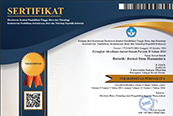Penti Ritual in Diasporic Lands: Manggarai Communitas of West Kalimantan
(1) Universitas Katolik Indonesia St. Paulus Ruteng, Nusa Tenggara Timur
(*) Corresponding Author
Abstract
In order to unite the Manggarai people in West Kalimantan, the Manggarai community leaders on behalf of the “Manggarai people” invited all Manggarai people to discuss the Penti ritual. The meeting resulted in an agreement to hold the Penti ritual. They received support from the Dayak Mualang community, so that the ritual could be carried out. This study describes the similarities and differences of the Penti rituals practiced in Flores and in West Kalimantan. The Penti ritual is held as a form of gratitude for the Manggarai people to God (Mori Keraeng) and their ancestors for their success abroad. The methodology used in this study is the ethnographic imagination methodology introduced by Paul Willis. Concepts used in the analysis of this study are the concepts of crossing and dwelling from Thomas A. Tweed and of liminality and communitas from Victor Turner. This study shows that the Penti ritual practiced by Manggarai people living outside their West Kalimantan hometowns contains important aspects, namely giving thanks to Mori Keraeng (God) and ancestors, fostering family relationships, and introducing the ritual to the younger generation of Manggarai in West Kalimantan.
Keywords
Full Text:
PDF (Bahasa Indonesia)DOI: https://doi.org/10.24071/ret.v11i1.4630
Refbacks
- There are currently no refbacks.
Copyright (c) 2023 Felomena Sunarti

This work is licensed under a Creative Commons Attribution 4.0 International License.
Retorik: Jurnal Ilmu Humaniora is published by the Graduate Program in Cultural Studies at Sanata Dharma University, Yogyakarta, Indonesia.
Retorik is also available in print edition. Please click here for contact information.










